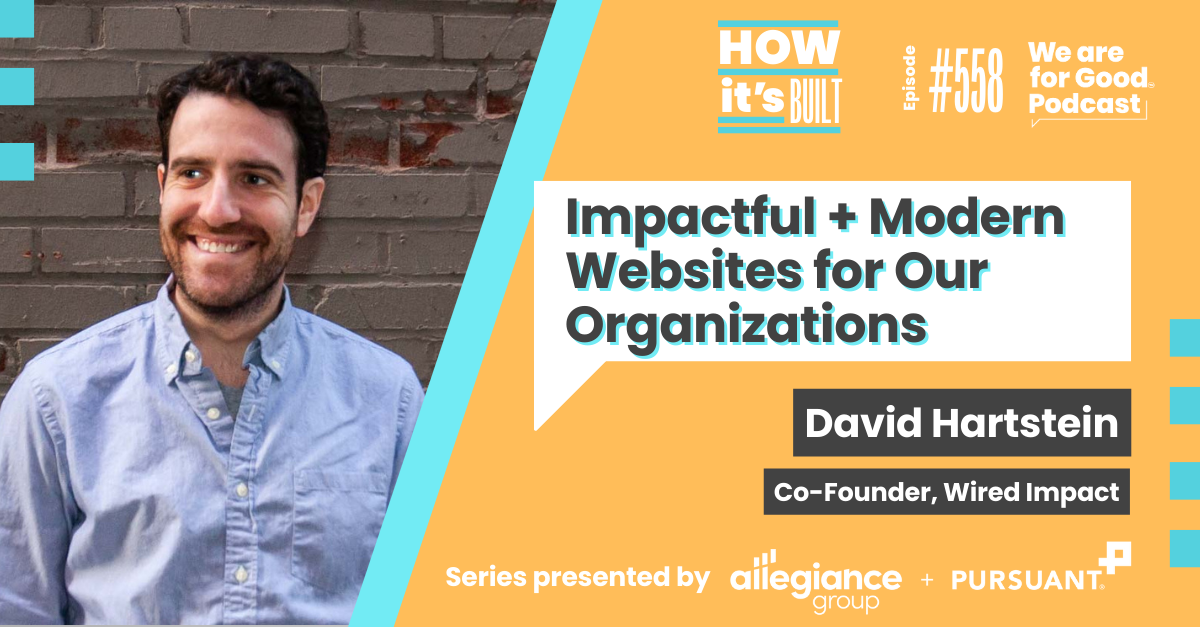558. How It's Built: Impactful + Modern Websites for Our Organizations - David Hartstein
Listen to this episode
Overview
Meet David. He’s the co-founder of Wired Impact, which helps nonprofits build websites their visitors will love 💻❤️ He’s a firm believer that good marketing doesn’t exist in a vacuum, and he works to uncover opportunities within websites to help missions do more good in their community. In this episode of "How It's Built”, he’s sharing the essential steps for creating an impactful nonprofit website. Get ready to transform your nonprofit’s website with these tried and tested insights🛠️💪
💡 Learn
What your website should be doing for your org and your visitors
How It's Built: Effective and Impactful Websites
Pro Tips + Lessons Learned
Today’s Guest
David Hartstein, Co-Founder, Wired Impact
“What do we want to be known for?”
Episode Transcript
Download Full Episode Transcript Here
Episode Highlights
David’s story and journey to where he is today (3:35)
The opportunity + impact for nonprofit websites today (8:20)
Questions to ask yourself to see if you need a new website (12:10)
Playbook: How to build an impactful website (15:25)
Website conversion rate killers (27:00)
Lessons learned + pro tips (36:00)
A powerful moment of philanthropy in David’s life (43:30)
David’s One Good Thing: The big things become small and the small things become big. (47:20)
How to connect with David and Wired Impact (51:00)
Impactful Quotes
"If you see a problem, you don't need to wait for someone's permission, you can just go out and try and solve it." -David
“What do we want to be known for?” -David
"Your website is your storefront to the world, but for so many nonprofits, they are so busy out there actually changing the world, that that website ends up as sort of a back burner project." -David
"Websites are very much a choose your own adventure type of experience, you don't know who they are, you don't know what page they're going to land on." -David
"Ask why they were moved to connect with your cause. And I think it for a lot of organizations, you're going to hear some pretty, beautiful things that are going to really spark some ideas around the best ways to engage your visitors….The reason it doesn't happen is it takes time, right? It takes time, but it's time well spent." -David
“We need to stop blaming short attention spans for a lack of engagement on our website. Attention spans are not the issue. It's a messaging issue.” -David
"Accessibility just sends a really clear message that everyone is welcome as part of your movement." -David
"The big things become small and the small things become big." -David
What role should a website be playing in our organization?
It should be driving traffic and awareness for your cause
It should be driving conversions and meaningful actions for your visitors
It should be saving your time - your visitors and your organization
How It’s Built: Effective and Impactful Website for Your Org ⬇️
If you are getting into building a new website, be realistic about how much time and capacity you have
Assign a dedicated point person that will run point on the website project.
Make sure they can carve out a meaningful amount of their workload for the website
Make sure they have the authority to make the final call on decisions
Identify your core audience.
Get really clear about who they are
You can have secondary audiences, but get clear on who you primarily are building the website to target
If you speak to everyone, you’ll speak to no one.
Dive deep into the audience’s problems
Outline the unique ways that you can help your audience.
What challenges are they facing?
How can you help in ways others can’t?
What do we want to be known for?
Lean into clarity in your messaging and positioning.
Optimize for conversions and engagement
For each page of your website, there should be one primary call to action.
Align calls to action with what your audience cares about, not just what your organization wants.
Where does our audience go to find solutions to those challenges or problems we mentioned before? (social media, search engines, thought leaders, etc.)
Align your solutions to provide your value wherever your audience is looking for those answers
Conduct audience research (SparkToro)
Interview your supporters
Pro tips
Embrace authenticity: Take best practices with a grain of salt and test what works for your unique community.
Run tests: Websites are a great testing ground for messaging and positioning - try small, incremental tests (don’t be afraid of failure!)
Prioritize accessibility: Accessibility sends a really clear message that everyone is welcome as part of your movement.
Connect with David + Wired Impact
Connect with Jon
Connect with Becky
CONNECT WITH WE ARE FOR GOOD
Join the We Are For Good Community
You can think of it as the after-party to each podcast episode 🥳
Say hi👇
LinkedIn / Instagram / Facebook / YouTube / Twitter







